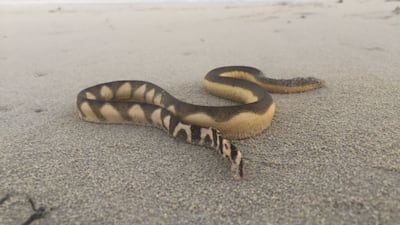Beachgoers in Abu Dhabi have been told to look out for sea snakes this winter.
The Environment Agency Abu Dhabi on Wednesday said sea snakes are peaceful towards humans unless provoked and despite bites being potentially fatal, they rarely attack or bite, and they use their toxins even more rarely.
In a post on social media, the EAD further cautioned against disturbing or handling the shy creatures if they are spotted on the beach as they may not be dead, but just “sluggish”. They have difficulty moving on land so they often wait for the tide to take them back to sea.
Sea snakes are commonly seen in Abu Dhabi coastal waters to feed and reproduce at this cooler time of year when temperatures hover around 22°C. They retreat into deeper water during the warmer months.
Only a few of the world's close to 70 known species of sea snake live in UAE waters. They can grow up to 2 metres long and are found in shallow waters, coral reefs and at beaches. Saadiyat Island and Abu Dhabi Corniche are where they are mostly seen.
The most common sea snakes in the UAE are the Arabian Gulf sea snake, the yellow-bellied sea snake and the ornate reef sea snake.
Advice if you see a sea snake
- Avoid touching or catching it
- Keep a safe distance
- Contact and inform the site management or contact the Abu Dhabi government call centre on 800555
- Share your location and photos if available
- In the event someone is bitten, it is advisable to get to a doctor quickly as venom can cause blood clots and damage the nervous system. A bite can also lead to nausea, vomiting, and, in very rare cases, it can be fatal
Late last year, it was revealed dozens of sea snakes were killed by an oil slick at Kalba off the UAE’s east coast.
Research about the incident that took place in 2021 showed how vulnerable the creatures are to marine pollution.
Oil can prevent the reptiles from swimming properly, while sea snakes also take in some of the oxygen they need through their skin, which is impossible if they are covered in oil.




